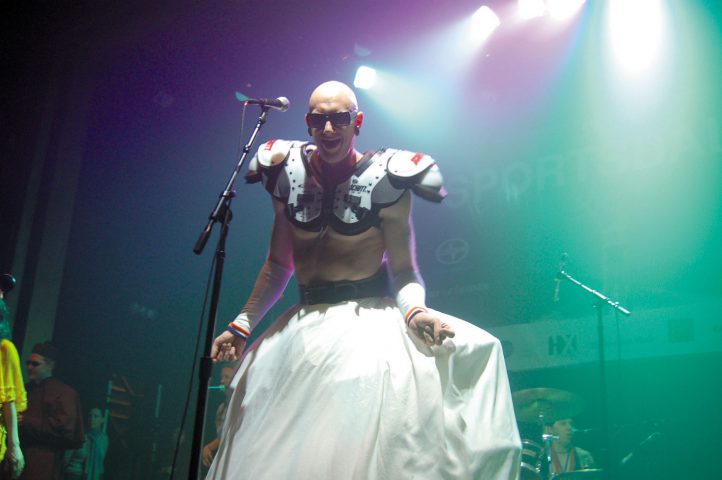Earlier this year, Time Out New York labeled me the “Diva of Queer Rock.” And though I found myself enjoying my new “diva” status, I had to ask myself: What is queer rock?
Perhaps the best place to turn for a fuller understanding of queer rock is to the genre’s forefathers and foremothers, those musicians who set into motion this sweeping musical movement and defined a niche for queer rockers to freely express themselves—and their sexuality. It was with this view in mind that I consulted Dean Johnson, the lead singer of the Velvet Mafia, whose presence in the New York queer-rock scene dates back to the early ’80s.
From the time when Johnson and I met in 2003 at HomoCorps, a queer music showcase at CBGB where my band Lisa Jackson and Girl Friday got its start, Johnson has schooled me on the history of queer artists. In the many queer music-focused conversations we’ve had, we have pinpointed, among other things, who we consider to be the founder of the queer-rock scene. As Johnson said to me, “No one stood on stage and sang about gay sex before Jayne County did.” Whlie many people would like to give credit to the glam rock era for starting this queer music movement, that simply isn’t the case. As Johnson duly noted “When Lou Reed sang ‘I’m Waiting for My Man,’ he meant his dope dealer. And Bowie was singing about ‘high-heeled boys’ while he was married to Angie.” Jayne County, a trannie, started this movement, and it only makes sense to pass the torch on to other trannies down the line.
Granting Ms. Jayne County the title “founder of queer rock” raises an important question: What does it mean to be a queer rocker? Do you simply qualify by being gay, or does it go deeper than that? Although everyone has his/her opinion on the matter, I personally feel that LGBT people have to start looking at the content of the queer music that queer artists are putting out. My old friend Barb Morrison, who has been on the scene since the days of Squeezebox and has worked with artists like the Scissor Sisters, Rufus Wainwright and Pretty Boys, provided some valuable insight into this debate. Her answer really hit home with me: “The responsibility for any artist, gay, straight, bi, omni, etc., is to just use your truth and your experience to tell your story and share your message.” She adds, “If we don’t share our truth with each other, then what are we even doing here?” To me, the idea of sharing your truth is what separates a queer rocker from every other gay artist. I believe that people like County, Johnson and myself are more interested in writing about our experiences with our sexuality than writing hit songs. And while writing hit songs is not necessarily a bad thing, I don’t think it will help in fostering awareness or furthering a queer-rock movement.
My investigation of queer rock’s past and my meditations on what it means to be a queer rocker have led me to create an inventory on the state queer rock and queer music as a whole, and frankly, I’m impressed. Not only does queer music have a very diverse and talented roster of musicians—Antony and the Johnsons, The Gossip, Tribe 8, and, of course, Amy Ray of Indigo Girls fame—but its artists also are creating their own outlets for their music to be seen and heard. Sirius Satellite Radio, for example, has been airing Sirius OutQ, a national broadcast LGBT news/talk/music station, and thanks to DJs like Jeremy Hovies and Larry Flick, up-and-coming LGBT artists have the opportunity for their music to be played on a national level for the first time.
Queer musicians also are enjoying the presence in the media sphere of NewNowNext, a music-video program aired on Logo that showcases LGBT tunes. Independent queer artists finally are getting the exposure that they deserve courtesy of LGBT media professionals, and as a result, queer music is moving forward at a rapid pace. Soon, queer rockers will not only be able to pursue a career that will provide for them financially, but the increasing presence of LGBT musicians in the media will aid in pushing issues of the LGBT community into the forefront of the public arena. In my humble opinion, our movement definitely has been put into motion and is underway.
I don’t know that I am really worthy of the title of “Diva of Queer Rock,” but I am ready for the challenge. Music has been my life for 20 years, and it has always been my dream to be a rock star. So I will accept this role, and this title, and I will not take lightly the honor of being featured on programs like Sirius OutQ and in articles such as this one. For me, these are huge accomplishments and I am thankful for the recognition that I am receiving. If you want me to be the Diva, then I accept, and I will continue to kick and scream until our voice is heard.





What Do You Think?